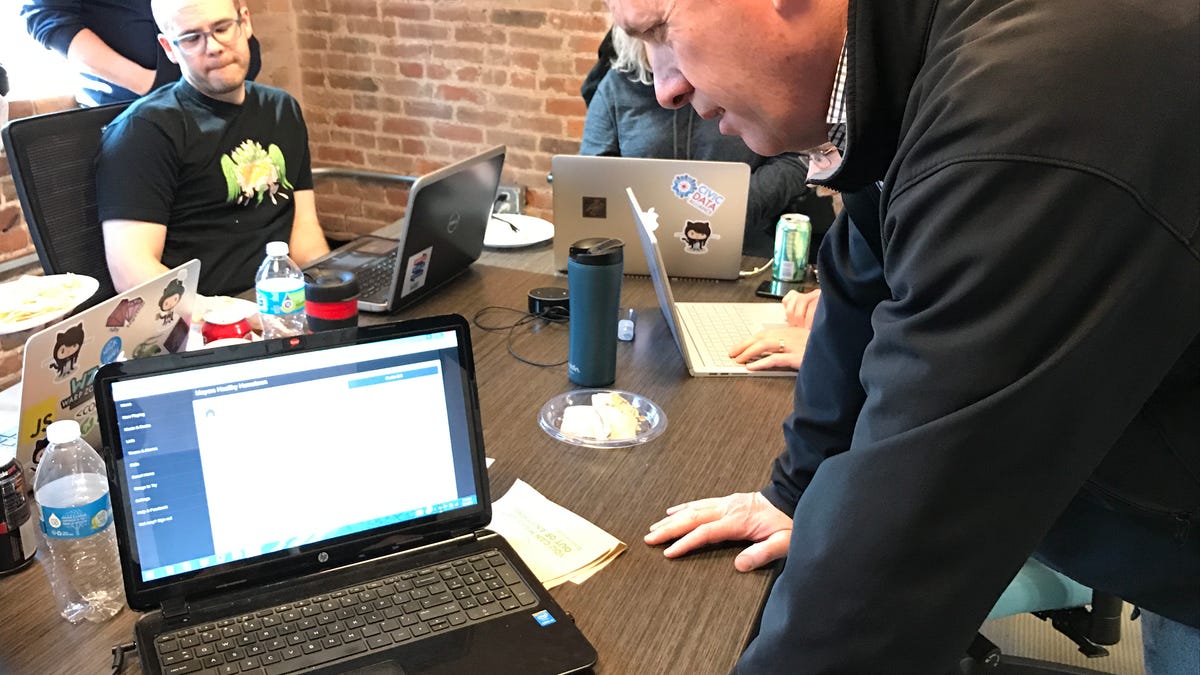Cities count on civic hackers to get the data to the people
Volunteer civic hackers are a driving force behind smart city efforts in Louisville and elsewhere.

It was a busy Saturday in downtown Louisville, Ky. While participants in a local 5K ran through city streets, dozens of civic hackers gathered a few stories up in a co-working space called the LouieLab for the Open Data Day hackathon. They worked on projects that would meet the hackathon's main goal: deliver public data to area residents that would connect them to their community.
"I can't think of anything more fun to do," said Margeaux Spring, one of the hackers at the event.
A group of civic hackers gather for a picture during Open Data Day hackathon in Louisville, Ky.
Hackathons like this have become the birthing ground for many of Louisville's smart city projects. Civic hackers and data enthusiasts like the ones gathered in the LouieLab, a city-run space open to the community, have become important in the efforts cities have made to become "smart," i.e., using city data and devices in the Internet of Things to connect citizens to their communities. These civic hackers aren't after fame (though a little bit of fortune if any of these projects turn into bona fide businesses probably wouldn't hurt).
Rather, they're looking for ways to use their tech skills to make the data that a city government collects more accessible to the general public and provide a foundation of facts upon which city officials can make decisions. In return, city governments receive expertise from residents who are invested in the community and do the work without being on the payroll.
"Things like this are important to build trust between citizens and government," said Louisville Mayor Greg Fischer, who stopped by the Open Data Day hackathon.
City data can include the seemingly mundane minutiae of city government, like building permit records or junk pickup dates, and headline-grabbing stats, such as the types of crime that occur in a specific neighborhood.
In Louisville, lots of that information is available as data sets on the city's open data portal site. Along with advocating for more local governments to make data available, Louisville's civic hackers develop interactive maps, new apps, integrations with existing products, or even create brand new products to make the info in those data sets more accessible and easier to understand. This has led to the development of a smart smoke detector and a channel on the free internet service IFTTT that lets you connect your smart gadgets and platforms to data about the city's air quality.
So why do hackers spend their weekends and free time looking at data?
"People want to feel connected to the places where they live and work," said Becky Steele, one of the co-captains of the Civic Data Alliance -- a collection of civic hackers who promote open data, hosting hackathons, coding education and civic engagement in Louisville. "Our job is to open up that data so everyone's voice can be heard."
It's not just Louisville that recognizes the importance of civic hackers. Brenna Berman, the chief information officer for the city of Chicago, said civic hackers really pushed for the city to make more data open.
"We rely on them to create assets that help the city of Chicago," Berman said. That has included an app that will send you an alert to move your car if the street cleaner is on your road.
And because civic hackers are citizens with their own investment in their neighborhoods, "they can use that data to do things that are micro-relevant," Berman said.
In Louisville, many of these developments start at events like the Open Data Day hackathon. Teams of student and/or professional developers and other folks interested in data gather for a weekend or one-day event. They have to solve a prompt that varies from event to event, such as developing an app, program or product that addresses a specific need or challenge.
An Amazon Echo dot voice-controlled device that uses Alexa.
At the Open Data Day event, Spring was part of a team that created Louisville-centric Skills for Alexa, Amazon's virtual, voice-activated assistant, such as the ability to ask Alexa for the latest Louisville smart city news. The creation of Alexa skills makes the data more approachable to citizens than trying to decipher data sets, said Spring, who's also a Civic Data Alliance co-captain.
"It takes something that, by its nature, is cold, and makes it approachable," she said. "Anything that helps people find out about their community is a good thing."

